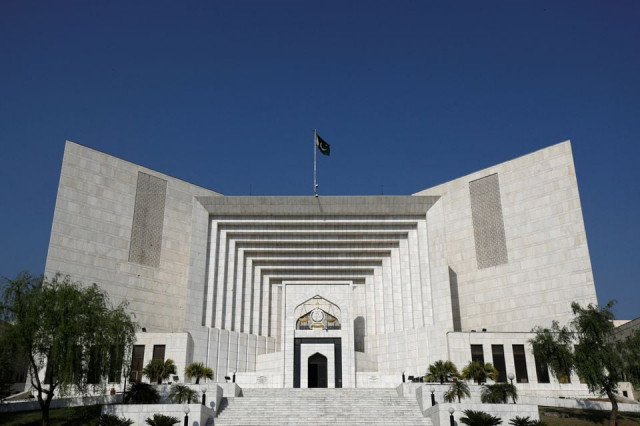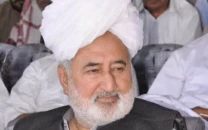Disqualification: CJP Isa flags glaring mismatch
Top judge points out incompatibility between SC ruling and Election Act

Chief Justice of Pakistan (CJP) Qazi Faez Isa on Monday flagged a discrepancy between the Supreme Court's ruling on lifetime disqualification and the tweaks introduced in the Elections Act, 2017, saying that the two could not co-exist.
The Supreme Court took notice of the discrepancy between the judicial decision on lifelong disqualification under Article 62 (1) (f) and the amendment made to the Election Act.
The apex court scheduled the hearing for January as it issued notices to the attorney general of Pakistan (AGP) and provincial advocate generals.The court further referred the matter, pertaining to ascertaining the period for disqualification, to the judges' committee to have it fixed before a larger bench for hearing.
The apex court's notice came on a petition filed by a former MPA of the Pakistan Muslim League-Nawaz (PMLN), Shamona Badshah Qaisrani, who was disqualified for concealing assets in 2014.
During the hearing on Monday, Justice Isa asked: “How can lifetime disqualification continue if a person’s sentence comes to an end?”In his response, the lawyer said that a person should be disqualified for submitting nomination papers on false affidavits, adding that the SC had issued its verdict in the Panama Papers case on the interpretation of Article 61(1)(f).
Justice Qazi Faez then remarked that the SC had two opinions on lifetime disqualification. "Disqualification in NAB [National Accountability Bureau] cases appears strict. How long will the disqualification be in a murder case?" he questioned.
Advocate Jilani pointed out that the disqualification of a politician in a murder case had been limited to five years. Justice Minallah echoed this by highlighting that even severe offences like child sexual abuse led to a five-year disqualification.
Bearings on upcoming polls
Following this, the presiding judge inquired about any recent legislative changes concerning Article 62(1)(f) and lifelong disqualification. In response, the lawyer said that the Elections Act had recently been amended, restricting disqualification to five years.
Justice Athar Minallah noted that the SC’s verdict on lifetime disqualification had become “ineffective” after the amendments made to the Elections Act.
He observed that the case was related to the 2018 elections, expressing concerns about whether it was feasible to hear it now that the next general elections were right around the corner. Meanwhile, the CJP pointed out that these amendments hadn't faced any legal challenges, making them a foundation for other parties.
"The inclusion of Section 232 in the Elections Act has essentially put an end to the concept of lifetime disqualification," he asserted.
Read SCBA set to challenge lifetime disqualification of MPs
The amendment to Section 232 (Qualifications and Disqualifications) of the Elections Act deems a permanent ban on a member as contradictory to both "the principles of Islam" and the Constitution.
The Chief Justice further highlighted that the general elections were around the corner, expressing concern over the ensuing confusion among returning officers, courts, and tribunals.
He emphasised the dilemma of whether to abide by the Supreme Court's 2018 verdict or the amendments in the Election Act.“This is not good for democracy,” he remarked.
Justice Minallah concurred, stating that the Elections Act would apply to the upcoming polls. He noted that all judgments related to lifetime disqualification had lost their efficacy following the amendments to the elections legislation.
However, the judge later remarked that there was no uncertainty regarding the next elections, and anyone trying to encourage it would be in contempt of the apex court.
The court observed that the current matter will not be allowed to be used as a tool to delay the February 8, 2024 polls, urging for notices regarding the case to be published in two mainstream English dailies.In 2018, in a landmark verdict, a five-judge bench of the SC had unanimously held that disqualification handed down under Article 62(1)(f) of the Constitution is for life.
Under Article 62(1)(f) of the Constitution of Pakistan, which sets the precondition for a member of parliament to be ‘sadiq and ameen’ (honest and righteous), former prime minister and PMLN chief Nawaz Sharif was disqualified by the SC bench on July 28, 2017, in references pertaining to the Panama Papers. Similarly, former Pakistan Tehreek-e-Insaf (PTI) leader Jahangir Tareen was disqualified by a separate bench of the apex court under the same provision.
Last year, legal experts had observed that it was interesting to note that a person who has committed a murder is allowed to contest the elections after a specific period of time, whereas, a lawmaker, who lies under oath, has been barred permanently.
In January 2022, legal eagles had raised objections that out of five, four judges, namely Saqib Nisar, Azmat Saeed Sheikh, Umar Ata Bandial and Ijazul Ahsan belonged from Punjab and also questioned the very nature of the bench that passed the landmark ruling.
Justice Sajjad Ali Shah, who belongs to Sindh, was also part of that larger bench.Interestingly, most of these judges were part of benches that issued rulings in high-profile cases.



















COMMENTS
Comments are moderated and generally will be posted if they are on-topic and not abusive.
For more information, please see our Comments FAQ